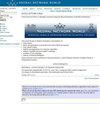基于自适应深度学习的模型预测云工作负载
IF 0.9
4区 计算机科学
Q4 COMPUTER SCIENCE, ARTIFICIAL INTELLIGENCE
引用次数: 0
摘要
对于云提供商来说,预测云工作负载是一个有问题的问题。最近的研究使我们在工作负荷预测方面有了显著的改进。尽管自适应系统在减少云资源数量方面具有重要作用,但这些系统仍然需要更准确、更详细和更快。提出了一种基于深度学习模型的自适应优化和减少云资源使用的方法。还演示了如何预测传入的工作负载以及如何管理可用资源。本研究使用PlanetLab数据集。所得结果与其他相关设计进行了比较。根据这些与最先进的深度学习方法的比较,我们提出的模型具有更好的预测效率,并将生产率提高了5%。本文章由计算机程序翻译,如有差异,请以英文原文为准。
A self-adaptive deep learning-based model to predict cloud workload
Predicting cloud workload is a problematic issue for cloud providers. Recent research has led us to a significant improvement in workload prediction. Although self-adaptive systems have an imperative impact on lowering the number of cloud resources, those still have to be more accurate, detailed and accelerated. A new self-adaptive technique based on a deep learning model to optimize and decrease the use of cloud resources is proposed. It is also demonstrated how to prognosticate incoming workload and how to manage available resources. The PlanetLab dataset in this research is used. The obtained results have been compared to other relevant designs. According to these comparisons with the state-of-theart deep learning methods, our proposed model encompasses a better prediction efficiency and enhances productivity by 5%.
求助全文
通过发布文献求助,成功后即可免费获取论文全文。
去求助
来源期刊

Neural Network World
工程技术-计算机:人工智能
CiteScore
1.80
自引率
0.00%
发文量
0
审稿时长
12 months
期刊介绍:
Neural Network World is a bimonthly journal providing the latest developments in the field of informatics with attention mainly devoted to the problems of:
brain science,
theory and applications of neural networks (both artificial and natural),
fuzzy-neural systems,
methods and applications of evolutionary algorithms,
methods of parallel and mass-parallel computing,
problems of soft-computing,
methods of artificial intelligence.
 求助内容:
求助内容: 应助结果提醒方式:
应助结果提醒方式:


